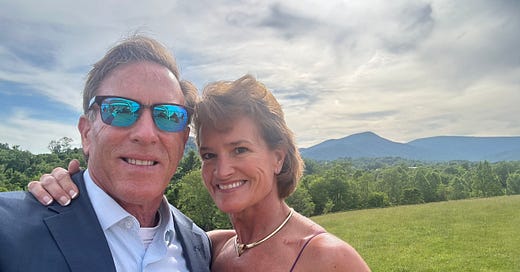A Doctor's Call to Action: Why the Pesticide Liability Protection Act Threatens our Food Supply and the Health of a Nation
A Doctor's Call to Action: Why the Pesticide Liability Protection Act Threatens Our Food Supply
A Doctor's Call to Action: Why the Pesticide Liability Protection Act Threatens Our Food Supply and the Health of a Nation
A physician, rancher and advocate examines the dangerous precedent of corporate immunity in agriculture
As stewards of the land and providers of our nation's food supply, farmers and ranchers carry a profound moral obligation—to produce the safest, healthiest, and most nutritious food on the planet. It is not just our livelihood; it is our responsibility to future generations.
That is why I am writing today with deep concern regarding the Pesticide Liability Protection Act currently under consideration in Congress. If enacted, this legislation could cause irreparable harm—not just to the health of farmers and ranchers who work directly with these chemicals, but to the broader public who unknowingly consume their residues.
The Dangerous Path of Corporate Immunity
This bill threatens to open the floodgates for a new wave of pesticides and herbicides engineered by agrochemical giants—products that may be even more toxic than those currently on the market. By shielding these corporations from legal accountability, it removes their last remaining incentive to ensure their chemicals are safe.
We have seen this story before. In 1986, Congress passed the National Childhood Vaccine Injury Act, granting pharmaceutical companies immunity from liability for vaccine-related injuries. The consequences were swift and staggering: a surge in new products, rushed to market without proper safeguards, and a dramatic rise in chronic health conditions in children and adults alike. It was a public health turning point, and not for the better.
The parallels to our current situation are striking. Consider the case of glyphosate, the active ingredient in Roundup. Bayer (which acquired Monsanto in 2018) has faced more than 177,000 lawsuits involving the weedkiller and set aside $16 billion to settle cases. Over $11 billion has been paid out in Roundup lawsuit settlements, with individual jury awards reaching as high as $2.1 billion in recent cases.
These staggering financial settlements reflect the real human cost of inadequate chemical safety oversight. Even more alarming is the widespread exposure we're seeing in our most vulnerable population: children. About 87 percent of 650 children tested had detectable levels of glyphosate in their urine, according to CDC analysis. Research shows that children exhibit higher levels of glyphosate in biofluids than adults, and recent studies indicate that higher levels of glyphosate residue in urine in childhood and adolescence were associated with higher risk of liver inflammation and metabolic disorders in young adulthood.
To repeat that same mistake with our nation's food supply would be unconscionable.
Why the Pesticide Liability Protection Act Is Unconstitutional
The Pesticide Liability Protection Act fundamentally violates several core constitutional principles that form the bedrock of American jurisprudence:
Due Process Violations (5th and 14th Amendments): The Act deprives citizens of their fundamental right to seek redress in courts for injuries caused by defective or dangerous products. This violates substantive due process by eliminating a basic property right—the right to compensation for harm—without adequate justification or alternative remedies.
Equal Protection Concerns: The legislation creates an arbitrary distinction between victims of chemical company negligence and all other tort victims. There is no rational basis for why those harmed by pesticides should have fewer legal rights than those harmed by other dangerous products.
Separation of Powers: By preemptively shielding an entire industry from judicial review, Congress unconstitutionally interferes with the judiciary's role in adjudicating disputes and determining liability. This represents legislative overreach into the judicial branch's constitutional domain.
Takings Clause Violations: The Act effectively takes private property—the right to legal recourse—without just compensation, violating the Fifth Amendment's Takings Clause.
The Supreme Court has consistently held that access to courts is a fundamental right, and any legislation that bars entire categories of claims must meet strict constitutional scrutiny. The Pesticide Liability Protection Act fails this test.
A Call for Leadership
Therefore, I strongly urge all agricultural organizations—from cattlemen's associations to farm bureaus, from organic growers to commodity groups—to go on record opposing the Pesticide Liability Protection Act. We must issue public statements and press releases declaring our stance against corporate immunity for chemical manufacturers. This is not just a matter of agricultural policy—it is a matter of public health, environmental integrity, and moral leadership.
In addition, I ask that agricultural organizations support Senator Cory Booker's proposed legislation, which seeks to hold chemical producers accountable and prioritize the safety of both producers and consumers. This is a rare opportunity to lead on an issue that will define the future of American agriculture.
The Choice Before Us
The agricultural community stands at a crossroads. We can choose to prioritize short-term convenience and corporate profits, or we can choose to protect the long-term health of our land, our communities, and our food supply.
The history of corporate liability shields teaches us a clear lesson: when companies are freed from accountability, public safety inevitably suffers. We cannot allow the same corporate immunity that transformed the pharmaceutical industry to be replicated in agriculture.
Let us be remembered not as the generation that turned a blind eye, but as the one that stood firm to protect our land, our people, and our food.
Dr. Brooke Miller is a physician, rancher, past president of the United States Cattlemen's Association, and advocate for agricultural safety and public health.
What are your thoughts on corporate liability in agriculture? Share your perspective in the comments below, and consider sharing this post with others who care about food safety and constitutional rights.


